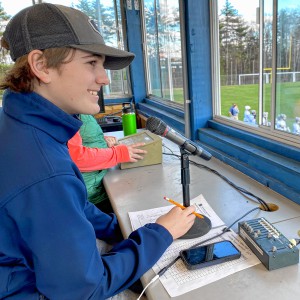For young adults impacted by homelessness, transitional living program provides support with housing stability
| Published: 03-06-2023 5:59 PM |
A duplex with beige shingles on Perley Street looks like many of the single-family homes in Concord’s South End. A small patch of grass makes up a front yard, with white paneled doors on either side.
This nondescript house hosts a transitional Living Program funded by Waypoint, a non-profit agency that works to improve the lives of children and families. While it might just be a typical Concord home to those who walk by, it is often a second chance for many residents who pass through.
Jerry Kabba and Jack Conley both lived in the house throughout the last year – using it as a landing point as they transition out of homelessness.
“I knew that going to Concord would change so much as in being around the wrong crowd, drugs, abuse and just all of that,” Kabba said. “Just working hard, working for myself.”
For many youth experiencing homelessness, transitional living programs like the one at Waypoint, provide guidance and shelter. But with limited beds throughout the state, Kabba and Conley are among the lucky recipients of support to restart.
When Kabba first moved into Waypoint’s transitional living, it was the first house he’d called his own in a while.
He’d previously lived in Manchester, often sleeping in the streets, in between nights at Waypoint’s young-adult shelter. Then he was accepted into the transitional living program, viewing Concord as his second chance.
For Conley, a Dover native, his path to Concord was a bit different. But moving into the transitional housing gave him a new chance to reset, he said.
Article continues after...
Yesterday's Most Read Articles
 N.H. Educators voice overwhelming concerns over State Board of Education’s proposals on minimum standards for public schools
N.H. Educators voice overwhelming concerns over State Board of Education’s proposals on minimum standards for public schools
 “It’s beautiful” – Eight people experiencing homelessness to move into Pleasant Street apartments
“It’s beautiful” – Eight people experiencing homelessness to move into Pleasant Street apartments
 Voice of the Pride: Merrimack Valley sophomore Nick Gelinas never misses a game
Voice of the Pride: Merrimack Valley sophomore Nick Gelinas never misses a game
 Matt Fisk will serve as next principal of Bow High School
Matt Fisk will serve as next principal of Bow High School
 Former Concord firefighter sues city, claiming years of homophobic sexual harassment, retaliation
Former Concord firefighter sues city, claiming years of homophobic sexual harassment, retaliation
 A trans teacher asked students about pronouns. Then the education commissioner found out.
A trans teacher asked students about pronouns. Then the education commissioner found out.
He’d previously bounced between a children’s home and his stepfather’s house on the Seacoast. He then moved to the McKenna House in Concord, run through the Salvation Army. From there, he was accepted into Waypoint’s transitional living program.
Conley’s now lived in the house almost a year. Kabba and other residents joke that he’s the Grandpa of the house. It’s in part humor, but also reflects the family they’ve created living together, supporting each other.
“Before Concord, I didn’t really have family,” said Kabba. “I mostly had myself.”
Now Kabba’s list of chosen family is long. Off the top of his head, he’ll rattle off the names of Waypoint staff members who have helped him find his way. One of those staff, is Lindsey Emond, who is the case manager for transitional living residents.
On a day-to-day basis, Emond helps residents navigate housing voucher applications, grow their savings and think through their next plan.
Case management is one requirement to live in the house, but when many residents have a history of past disappointment or abandonment, trusting this support can be a challenge in itself.
“I had to understand that there are people here to help me and better my life,” said Kabba. “And I had to take that advice from people, and better my life. It was very hard for me.”
While transitional living programs like the one at Waypoint offer a source of support and shelter, they have limited capacity and long waitlists. Often, people like Kabba and Conley are among the lucky recipients who get offered a second chance.
The Waypoint program has a clear purpose – provide supportive housing for up to 18 months for young adults ages 18 to 21 years-old, with the goal of guiding residents towards self-sufficient, independent living.
To qualify for the transitional living program, residents must be currently experiencing homelessness or at risk of doing so.
While living in the house, residents must meet with case workers like Emond to talk through employment opportunities, financial planning and goal setting.
They have to perform weekly chores and attend life skills meetings. Previously, they had to pay rent, but now Waypoint encourages residents to put that money into their savings instead.
This model of supportive housing follows the approach that other service providers take when assisting clients experiencing homelessness. The Concord Coalition to End Homelessness also utilizes case management services for their permanent supportive housing – where clients are placed into local apartments, constructed and owned by the coalition.
The idea comes from the “housing first” model – that to be successful in other avenues in life, one must have a consistent shelter to call home.
For young adults transitioning out of the foster care system or youth homes, but still navigating the adult sector of services, programs like Waypoint’s provide an in-between.
Despite estimates of 15,000 youth experiencing homelessness at some point this year, only a handful of homes provide reprieve for young adults in need, Concord’s transitional living home, as well as one in Manchester and both men and women’s homes in Dover, are all run by Waypoint, which used to be called Child and Family Services before the agency changed its name in 2018.
The Nashua Children’s Home also provides an adolescent transitional program, for people between the ages of 18 and 20.
Since living in Concord, Kabba and Conley don’t hesitate when asked what’s next in life.
For, Conley that’s working at Amtrak some day. He likes to travel, and has loved trains since playing a simulator game on PlayStation growing up, he said.
And for Kabba, what’s next involves making music. He’s always played the trumpet. Now he likes to sing, rap and listen to rock – he has released his own music on streaming platforms like Spotify under the stage name Ezra Blair.
“In Concord, I’ve been traveling more for music and I’ve been evolving musically because of it,” he said.
Both men have jobs in Concord, with Waypoint staff helping them to manage and save money.
Kabba works as a server at the Common Man and Margaritas and Conley currently works for Enterprise.
“Financially, I’m able to watch my money now,” said Kabba. “I’m just very grateful for the staff to help me and to be there as like a support system, and be real and tell me ‘hey, watch your money’.”
Since he moved into the house in May, Conley has applied for a housing voucher in Dover. He hopes to move back to the Seacoast, but this time with an apartment of his own.
For both of them, their time in Concord has allowed them to refocus and reset. In hindsight, the support was a necessary change, said Kabba.
“They will tell you what is wrong and what is right. They will help you in the most possible way they can,” said Kabba. “I wouldn’t be where I am if it wasn’t for specific staff.”
For youth experiencing homelessness who need Waypoint services, call 603-518-4380 for information about transitional living homes in Concord, Manchester and Dover.
To inquire about transitional living in the Nashua Children’s Home, email Lea Reilly at lreilly@nashuachildrenshome.org
Waypoint will be hosting it’s 8th annual SleepOut on March 24. For one night, participants are invited to sleep outside for the night in solidarity with youth experienc ing homelessness. They are also asked to raise at least $1, 000 to support Waypoint. To register visit www.waypointnh.org/happenings/sleepout2023


 With less than three months left, Concord Casino hasn’t found a buyer
With less than three months left, Concord Casino hasn’t found a buyer Kearsarge Middle School drone team headed to West Virginia competition
Kearsarge Middle School drone team headed to West Virginia competition Phenix Hall, Christ the King food pantry, rail trail on Concord planning board’s agenda
Phenix Hall, Christ the King food pantry, rail trail on Concord planning board’s agenda
